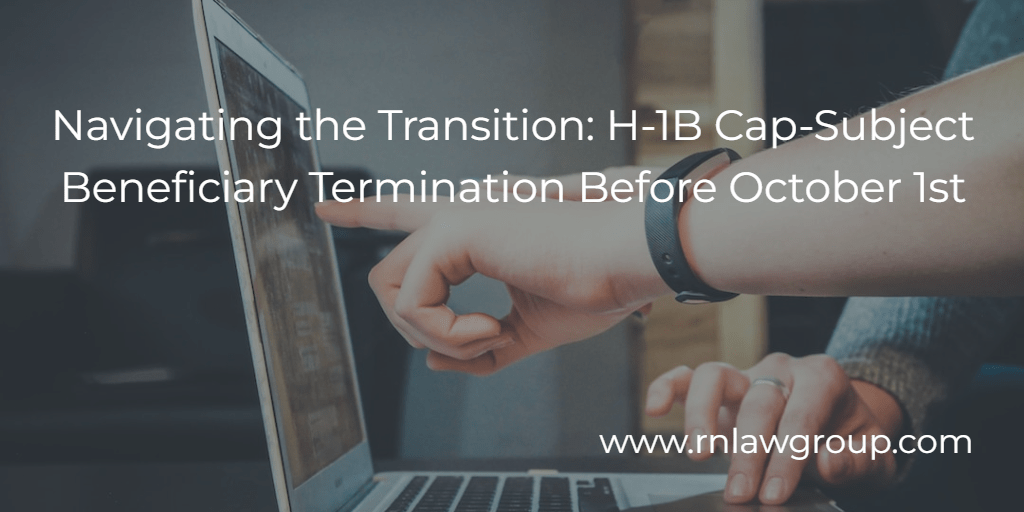
Navigating the Transition: H-1B Cap-Subject Beneficiary Termination Before October 1st
The H-1B visa program has strict numerical limits, known as the H-1B cap, which allocate a limited number of visas each year for foreign workers seeking employment in the United States. As of now, the annual cap stands at 65,000, with an additional 20,000 visas reserved for U.S. master’s degree holders. Those who are being sponsored for an H-1B work visa for the first time fall under the category of “subject to the cap” and must be counted within this limit.
In recent years, the allocation of cap numbers has transitioned to an electronic registration process. Employers seeking to sponsor a worker for an H-1B visa are required to submit the worker’s name and biographic information electronically. The U.S. immigration service then randomly selects enough registrations to reach the numerical limit and allows employers to file petitions for selected workers, usually between April and June. If approved, the H-1B visa becomes effective on October 1st. For workers already in the United States under a different immigration status, employers typically request a change of status so that the worker’s immigration status changes to H-1B automatically on October 1st.
This process often involves international students who are in the United States on an F-1 visa. After graduation, these students are eligible for Optional Practical Training (OPT), which grants them work authorization for one to three years. Employers hiring such students often sponsor them for an H-1B visa to extend their employment beyond the OPT period. The H-1B approval usually comes through in the summer months but takes effect on October 1st.
But what happens if the employer decides to terminate the employment before October 1st?
In theory, an employer can immediately notify the U.S. Citizenship and Immigration Services (USCIS) of the termination, request the withdrawal of the approved H-1B petition, and allow the student to continue under their F-1 OPT status, assuming it remains valid past October 1st. However, in reality, USCIS may not process the withdrawal request promptly, leaving the student in a tricky situation.
During this limbo period, the H-1B approval becomes effective on October 1st, and the student’s SEVIS record is automatically terminated because the system recognizes the H-1B approval. This leaves the student in a state of being technically in H-1B status but no longer employed by the sponsoring company, effectively putting them out of status.
A potential solution involves the school official requesting a “data fix” in the SEVIS system by informing Immigration and Customs Enforcement (ICE) that the H-1B petition has been withdrawn. Unfortunately, ICE typically waits for USCIS confirmation of the withdrawal, which can take weeks or even months, leaving the student in a state of uncertainty and unable to obtain a new I-20 to validate their student visa status or travel outside the United States.
But is it necessary for the employer to immediately notify USCIS of the termination if the employee is technically still in F-1 student status and the H-1B has not yet taken effect?
Remember, that until October 1st, the worker remains an F-1 student so it is F-1 regulations that should be applied during this transition period. While employers are required to notify a student’s school within five business days of termination if the student is working under the 24-month STEM OPT extension, there is no such requirement to notify USCIS in the event of an F-1 student’s employment termination. The H-1B regulations stipulate that the petitioner must immediately notify USCIS of any changes in the terms and conditions of employment that may affect eligibility. If the petitioner no longer employs the beneficiary, they should send a letter explaining the change(s) to the director who approved the petition. The approval of any petition is immediately revoked if the petitioner files a written withdrawal.
However, when an H-1B petition has been approved but has not yet taken effect, the regulations are silent. If a petitioner waits until October 1st to notify USCIS of the termination, when the H-1B takes effect, they should be considered compliant with Department of Labor and Department of Homeland Security regulations.
So, why would an employer wait until October 1st to notify USCIS?
In this scenario, once the H-1B takes effect on October 1st, the worker’s status automatically shifts from F-1 to H-1B, and they are officially counted within the H-1B cap. This means that in the future, the worker can obtain an H-1B approval with another employer without going through the registration and lottery process again. Additionally, workers in H-1B status who have been terminated are eligible for a 60-day grace period. These regulations permit a discretionary grace period during which H-1B workers (and their dependents) can maintain their nonimmigrant status and potentially find new employment through an H-1B transfer or change of employer petition.
While terminating employment is never an easy decision, it can be even more challenging for immigrant workers, particularly during the transition period between F-1 and H-1B status. Employers should carefully consider when to notify USCIS of termination to provide their workers with the opportunity to seek new employment and continue in H-1B status.
By: Emily Neumann
Emily Neumann is Managing Partner at Reddy Neumann Brown PC with over 15 years of experience practicing US immigration law providing services to U.S. businesses and multinational corporations. Emily has helped transform the firm from a solo practice to Houston’s largest immigration law firm focused exclusively on U.S. employment-based immigration. She received her Bachelor’s degree in Biology from Central Michigan University and her Juris Doctorate degree from the University of Houston Law Center. Emily is a frequent speaker and has been quoted in Bloomberg Law, U.S. News & World Report, Inside Higher Ed, and The Times of India on various hot topics in immigration. She is a member of the American Immigration Lawyers Association and Society for Human Resource Management.
Reddy & Neumann has been serving the business community for over 25 years and is Houston’s largest immigration law firm focused solely on US. Employment-based immigration. Reddy & Neumann is certified as a woman business enterprise by NWBOC. We work with both employers and their employees, helping them navigate the complex immigration process with confidence.

